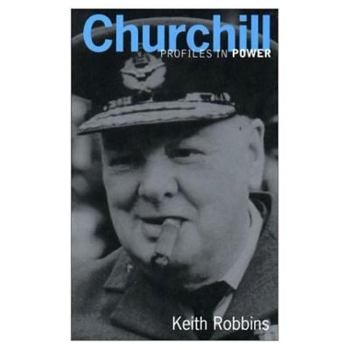Book Overview
Keith Robbins provides an excellent introduction to Winston Churchill's dramatic rise to power and traces the unpredictable way his career moved between triumph and tragedy. Providing a vivid picture of the political landscapes through which he moved, it outlines his career and uncovers what made possible Churchill's leading role in national and world affairs.
Format:Paperback
Language:English
ISBN:0582437598
ISBN13:9780582437593
Release Date:August 2000
Publisher:Routledge
Length:196 Pages
Weight:0.60 lbs.
Dimensions:0.4" x 5.0" x 8.4"
Customer Reviews
1 rating
Churchill - - the ultimate opportunist and great leader
Published by Thriftbooks.com User , 15 years ago
By most reasonable standards, Sir Winston Churchill was one of the great leaders of the Twentieth Century - - if not the greatest. Robbins portrays him as the ultimate conniving and opportunist whose only persistent idea was to 'Defeat Germany.' As Robbins writes, "Indeed, Churchill had to admit that he very rarely detected genuine emotion in himself and normally lacked 'a keen sense of necessity or of burning wrong or injustice' such as would make him 'sincere'. It could be, therefore, that politics was an activity without values." During World War I, Prime Minister Lloyd George wrote of Churchill and the ill-fated Gallipoli campaign, "When the war came he saw in it the chance for glory for himself and has accordingly entered on a risky campaign without caring a straw for the misery and hardship it would bring to thousands, in the hope that he would prove to be the outstanding man in this war." In retrospect, looking back for a hundred years, is such an attitude better or worse than the burning ideologi8cal certainty of leaders such as Lenin, Stalin, Hitler, Mussolini, Mao Tse Tung, Hidekei Tojo and others who fanatically tried to inflict their beliefs on the world? Maybe the opportunist, always trying to satisfy the latest wishes and whims of "the people", is the ideal leader for a democractic world. Consider, for example, the impact of true believers such as the neo-cons of the Bush administrataion compared to the relaxed opportunism of the Clinton years. As for Lloyd George, Prime Minister of Britain during World War I, he had no shame in sending hundreds of thousands of young British men to their deaths under the command of hopelessly inept but properly aristocratic generals in the trenches of Europe. Churchill at least tried an end run at Gallipoli, instead of constantly trying to bully through the middle in futile power plays. Churchill may have blundered at Gallipoli; but, it's more likely the blunders were due to obstruction by Lord Kitchener and Sir John Fisher. Faced with a new idea, they doomed this innovative maneuver. Instead, their always seemed to favour the "glory" of a spirited rush by a mass of determined men to overwhelm defenders with machine guns. Granted, Gallipoli wasn't Churchill's only blunder. He erred as badly in the spring of 1940 in assuming Norway could not be conquered, due to the presence of the Royal Navy in Scapa Flow. So, instead of invading by ship, the Germans used airplanes. The Royal Navy beat a hasty retreat, just as at Gallipoli. A few weeks later, Churchill became Prime Minister. Clearly, he was an opportunist - - always willing to respond to most of the people most of the time on most issues. It seems, right or otherwise, that's what democracy is all about. It's not the ideological purity and ansolute certainty of being always right all of the time on all issues; it's responding to the people, and having the courage to admit and correct mistakes when they occur. Be




